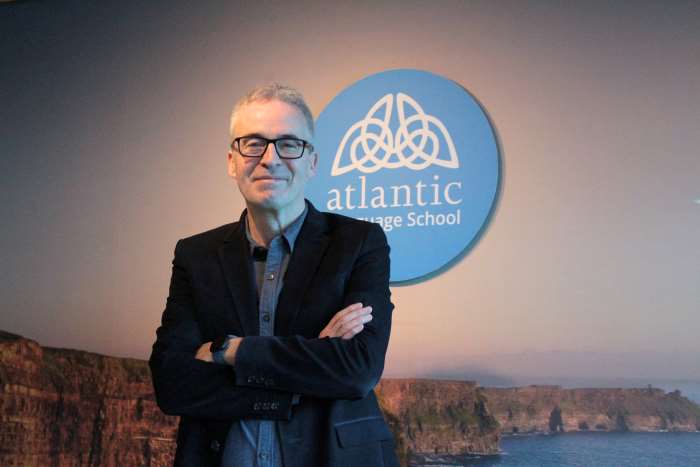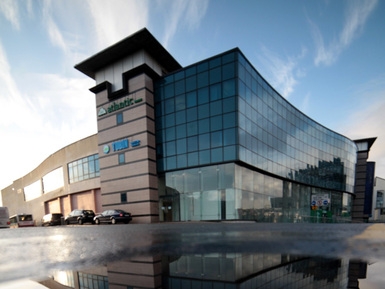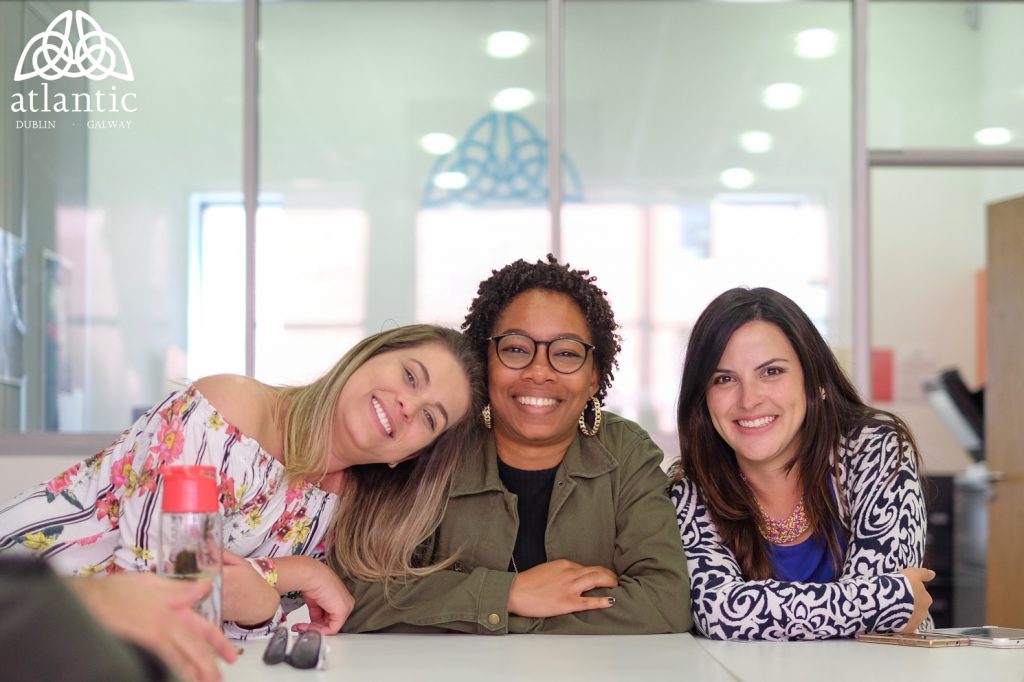Meet the Director – John Daly Atlantic Language School Galway
What was the inspiration behind starting your language school?

I really enjoyed teaching. After college I spent a year teaching English in a school in Vigo, in Galicia and after that I spent two years teaching in Berkeley, San Francisco. These were great experiences which really lit the fire in me. When I came back to Ireland I took a job as Director of Studies in Galway, ended up staying there, and got the opportunity in 1993 to start a new school in the city. It was just a couple of little classrooms in a very old building in the attic. I was teaching and answering the phone and putting on the kettle and doing everything possible. It was a very small outfit but thankfully word of mouth spread and the school started to grow slowly but steadily. 31 years later we have one of the most established language schools in Galway, based in a great building in the city centre, with the bonus of some nice accommodation to offer students.
When you started the centre what were the biggest challenges?
Well for me, I didn’t know very much about the whole marketing and sales side of things. I hadn’t come from that background, I had done an arts degree at university, and a higher diploma in teaching so I was coming at it from the academic perspective so for me getting the school on a professional footing and establishing a brand or a name was the biggest challenge. I took myself off to Berlin to the ICEF education workshop, which was an eye-opener, and I figured out key to getting established was through the whole network of language travel agencies. So I started to attend workshops, to visit agencies, to slowly but surely put Galway on the map in terms of English language destinations. Everybody knew Dublin, but they didn’t know so much about Galway in the west of Ireland. As the school grew sourcing our own building was critical to growing the business. I then as I grew, finding a bigger building, know, sourcing another building in the centre of the city, getting planning permission for an educational building, so we’ve kept growing all the time. But I think we have got to a stage now where we’re well established, we have our own building, we own our building, we own our accommodation, and we can control our own destiny as regards what we do.
How has your centre evolved since its inception?

As I mentioned before we started out in a few attic rooms at the top of a very old building. It wasn’t really fit for purpose and as we grew we kept renting extra rooms, spreading from one floor to another until I made the big decision in 2011 to take on a newly constructed city centre building. It was just a shell and I was able to design the space to fit our needs as a language school. That was a big step forward, a risk at the time but one that has really paid off. In time I was able to purchase the building and develop it exactly as we wanted. So essentially it’s a purpose built language school; everything’s on one floor with lots of glass and light and plenty of space for students and staff to mix and mingle. The building was a major part of our evolution and of course as we grew our staff increased with sales and marketing people on the road and a full operations team on site.
What values or principles guide your company?
That’s a good question. I’ve always tried to put myself in the shoes of someone getting on a plane in Seoul or Barcelona who is coming to Ireland in search of a meaningful and productive experience. I’m always conscious that it’s my responsibility to make sure that we’re doing what we promised to do, to provide great hospitality and positive learning. Students should feel that they’ve landed in a warm and engaging place where they can learn, relax, socialise while getting to know the culture of Galway and the west of Ireland. Continuous improvement and attention to detail are key principles for me – improving the building, the facilities, the teaching standards, training staff, investing in the business and keeping quality control to the forefront. I think the steady growth we’ve experienced from the very first days of the school are testament to the positive impact of these principles.
How do you maintain a strong company culture?

It’s hard to put a finger on the perfect formula to sustain a strong company culture – it’s quite intangible. But there are a few things that come to mind. One is that people should see that the owner has a clear idea of what he’s aiming to deliver, and that all our work is driven by core principles of professionalism. It should be clear that there’s integrity at the heart of what we’re doing, and that we’re always willing to listen. If there’s a problem, solve it! The customer spends only a short time with us. They’re going to experience difficulties – we’re not perfect. We have to be humble and hold up our hands if something goes wrong. For example if a customer is unhappy with a teacher, it should be sorted out straightaway. I’m a big fan of meeting someone face to face if there’s a problem; direct communication almost always defuses a situation and sorts everything out. Our staff, in fairness, get this. They regularly see me engaging with students, meeting newcomers on Monday morning, and generally interacting as much as possible with people.
I want to see that our students have a strong sense of who the staff are, that we’re accessible, easy to talk too and above all warm and friendly. These are core guiding principles. And I’ve been very fortunate with my staff, many of them came as interns and loved the place so much that they stayed on to work for me, bringing with them the experience of having studied in the school and lived in Galway, loving it so much they’ve chosen to make it their home.
It’s vital to make sure that standards are being maintained. Customer feedback is essential to this process. If you’re not looking at your feedback every week and reacting to it, addressing the issues, there’ll be a drift away from improvement. You have to be really rigorous and honest. We have feedback at the end of the first week and again at the end of the course. You learn an awful lot about how people are reacting to the school, what’s happening inside the classrooms, how staff are interacting and how effective they’re operating with help and solutions for problems. We pride ourselves on dealing with things quickly and promptly. Feedback to me has always been the best pulse to see that the culture is being maintained.
And how do you foster collaboration and teamwork?
Good morale is essential. Our staff is culturally diverse – Italian, Spanish, Indian, Turkish, Polish, as well as Irish – a lovely balance of nationalities. There seems to be a great spirit among the staff – they tend to go out together at the end of the week, to meet up at weekends and so on. They seem to enjoy working together and that’s a great sign, and allowas for positive collaboration. I try to get people to use their initiative – to use their instincts, their personalities, to make sure that the weekly feedback is showing that we’re doing what is expected of us, successfully. Success comes from people giving great feedback, and that’s coming from the staff. So if the staff are happy and there’s good morale, they’re getting on well with each other, they’ll help each other, they’ll collaborate with each other, and you can just kind of help that along. Investing in training is something I’ve done throughout my career, – if staff request professional development I will always help – that’s something I’m passionate about. We’ve invested a percentage of our turnover for years now on professional training and have been really pleased with the results.
How do you incorporate sustainability and corporate responsibility within your company?
The most practical example of that is that about 2 years ago we decided to apply for recognition as a Green Standard School, tackling every aspect of the business in the process. We aspire to be as green or sustainable as possible in everything we do – reducing textbooks, photocopying, limiting water use, introducing recyclable cups, waste recycling etc. We also contribute to carbon offsetting – in this business of course we’re depending on people flying in and out of the country. Our brochure and all the marketing materials are all sustainable. The materials in our student welcome packs have all been carefully sourced. It’s taken time but a bonus has been the enthusiasm of the staff who’ve enjoyed getting involved in the process. Developing green classrooms has spilled into the teaching side of things too with many teachers eager to apply principles of sustainability in the classroom. As sustainability is one of the core principles of the current Erasmus programme, there’s been a lot of interest from European teachers who appreciate the opportunity to experience how these principles are applied in the Irish educational system. Atlantic made the decision in 2019 to move into the area of staff training as supported by the Erasmus staff mobility programme. We made a deliberate decision that our school would move away from general courses into this area. As I see it there is a tremendous hunger among university staff for professional development. Yes, improving their English skills is important to them, but they also want to be able to use the language in a professional arena. So, we designed courses then that suit employees who are working in universities, as teachers or administrators.
Most European universities are taking in a huge cohort of international students and many staff have to deal with the registration and administration of students travelling both in and out of universities as part of the Erasmus exchange experience. Staff are looking for courses that will give them the skills and confidence to provide these services in their institutions.We have pivoted almost completely towards dealing with staff mobility, particularly higher education but also catering for secondary and primary school teachers.
What do you personally consider to be the benefits and opportunities from Erasmus + for participants and institutions?
Well for example, if you take a university employee in Poland, or Hungary or Italy who’s being asked, increasingly, to interact with international students and staff, whether in the registrations office or in the classroom. There’s an immediate practical need for staff like these to upskill their English language communication tools. A school like Atlantic can offer a course that will address the day-to-day needs produced by internationalized campuses. Staff need to improve their English language but also learn vital communication skills for dealing with visiting students through English. They also get an opportunity to meet similar administrators or teachers from different universities; the networking possibilities are great, finding out, for example, how are someone approaches the same challenges in France or in Sweden?
What can participants hope to achieve by attending an Erasmus Plus Professional Development course at your Language Training Centre?
Yesterday, we hosted a networking event and I met a number of people from French universities. I met one particular woman, and she told me about that she has now moved into international development and relations within her university within the communication department. She was rather shy and told me she was out of her comfort zone and when she arrived here, she was nervous and anxious. “It’s Tuesday. I’m on day two. I feel my anxiety is starting to subside a little bit. I’m feeling a little bit more confident. I can see what this course can do for me. I can see the skills it can give me” and on a purely empathetic level, I said to her, “Well, you’ve come outside your comfort zone. You could have stayed in your French university, you could stayed with your colleagues speaking French but you’re here today, meeting German, Swiss and Italian people, you’re going to do a presentation next Friday, you probably couldn’t have imagined yourself doing that a year ago, and now you’re going to stand up in front of your peers and you’re going to do a piece on what you do in your university!” That’s a fantastic achievement in one week, you push yourself into this space and you’ll see the benefit and it’ll give you confidence going forward.
That’s the thing that keeps me going. 31 years later I still get a tremendous sense of achievement from helping people to have a great experience in Galway. Our location is a key part of it as Galway is genuinely a brilliant place to come. People fall in love with the city. It’s a magical place. It’s surrounded by beautiful landscapes. In 40 minutes you can reach the Aran Islands or at the Cliffs of Moher, standing on these beautiful cliffs or admiring the mountains of Connemara. In the city there are great pubs, Irish music, plenty of of Irish “craic” and the chance to share experiences with staff from other European colleges.
What are your goals and aspirations for the future of your business?
We are changing, and change is always difficult, right? We were a language school offering traditional English language courses and we were very successful, represented by agencies all over the world, sending us business. Now we have decided to market a different constituency – education professional, based mostly in Europe. It’s a very different cohort of customers or students coming to us than it was for all those years. That means change, internal change, new processes, new energy, new focus. It also means our own staff are going to have to upskill, and our digital marketing strategy is going to have to be converted and changed. So we have a lot happening and that requires training internally. We have to change our focus, our whole approach. It’s a kind of renewal. And that’s the best thing that any business can do. Every now and then we need to stand back and say, “Are we doing something fresh? Are we doing the same as everybody else? Can we change it up?” We are trying to do that. And, of course change is never easy. But if you achieve it, your business is always the better for it!
Learn more about Atlantic Language Galway
